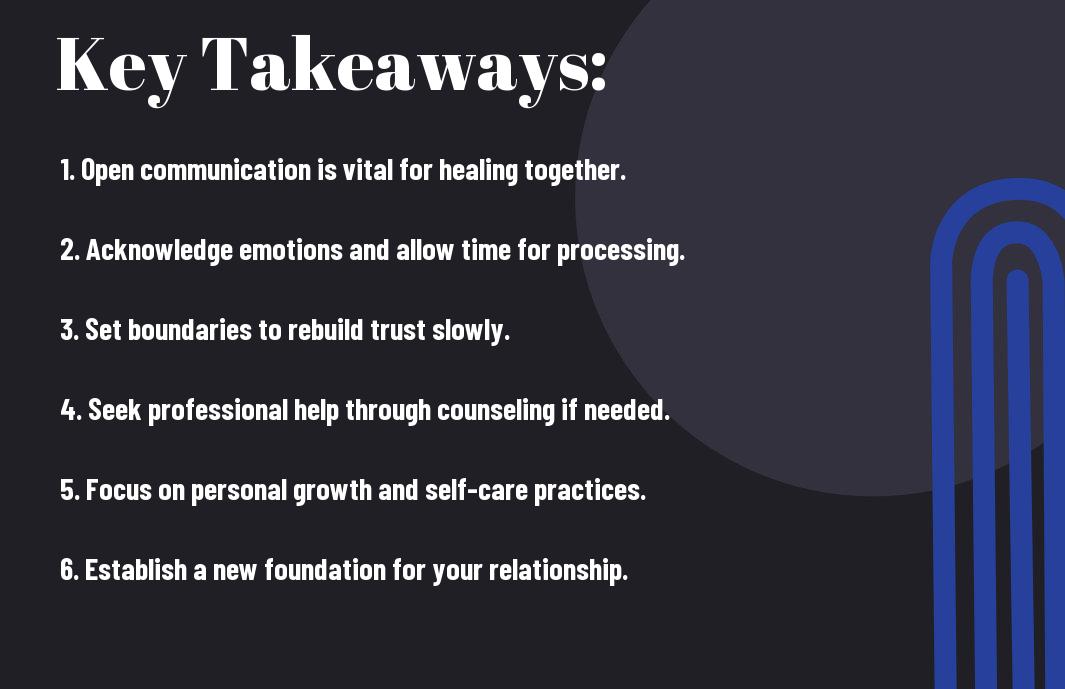Just as the pain of infidelity can feel overwhelming, the path to recovery can seem daunting. However, understanding your emotions and prioritizing effective communication with your partner is key to rebuilding trust and intimacy. In this guide, you will explore practical strategies for healing, such as seeking professional support, setting boundaries, and allowing yourself time to grieve. Embrace this opportunity for personal growth and transformation as you navigate the road to recovery, empowering yourself to turn heartbreak into healing.
Key Takeaways:
- Understand the importance of open and honest communication between partners post-infidelity.
- Establish a safe space for discussing feelings, thoughts, and concerns without judgment.
- Recognize that healing takes time and can involve emotional ups and downs.
- Consider seeking professional help, such as couples therapy, to navigate complex emotions.
- Focus on rebuilding trust through consistency and transparency in actions.
- Encourage individual self-reflection to understand personal feelings and needs after the betrayal.
- Explore ways to create new, positive experiences together to foster connection and intimacy.


Understanding Infidelity
To navigate the tumultuous waters of infidelity, it’s crucial to understand its complexities. Infidelity can shake the foundation of your relationship, leaving you grappling with emotions that range from betrayal to confusion. By delving into the roots and reasons behind infidelity, you can begin to disentangle your feelings and work towards healing.
Types of Infidelity
To comprehend infidelity fully, you should consider its various forms:
- Emotional Infidelity: Involves forming a deep emotional bond with someone outside your relationship.
- Physical Infidelity: Entails sexual relations with someone other than your partner.
- Cyber Infidelity: Involves inappropriate online interactions, such as flirting or sexting.
- Micro-cheating: Consists of small actions that betray emotional commitment, such as secret texting.
- Serial Infidelity: The pattern of cheating within different relationships.
After understanding these types, you can better identify and address the specific issues contributing to your pain.
| Types of Infidelity | Description |
| Emotional Infidelity | Deep emotional connection outside of the primary relationship. |
| Physical Infidelity | Sexual relations with someone not in the primary relationship. |
| Cyber Infidelity | Inappropriate online interactions. |
| Micro-cheating | Small, secretive actions that betray trust. |
| Serial Infidelity | The repeating pattern of infidelity in various relationships. |
Emotional and Psychological Impact
The aftermath of infidelity can create a profound emotional and psychological toll on you. Feelings of deep betrayal, anger, and confusion may overwhelm you, making it crucial to process these emotions thoroughly. Your trust may be shattered, leading to issues with self-esteem and self-worth.
Plus, these experiences can manifest in various ways, such as anxiety, depression, and difficulty in future relationships. Understanding the emotional aftermath is vital for your healing journey and can facilitate a path towards recovery. You must acknowledge your feelings and seek support, whether through friends, family, or professionals, as these actions will ultimately fortify your healing process.
The Healing Process
There’s no single path to healing after infidelity; each person’s journey is unique. However, acknowledging your emotions, seeking support, and fostering open communication with your partner can be pivotal in your recovery. Understanding that healing takes time is crucial, as both partners navigate through the complex emotions involved.
Acknowledging the Pain
To move forward, you must confront the painful emotions stemming from the betrayal. Don’t suppress your feelings; instead, allow yourself to experience the hurt, anger, and disappointment. By acknowledging these emotions, you can begin to process them, paving the way for healing and understanding.
Stages of Recovery
With each stage of recovery, you will experience a wide range of emotions and challenges. Commonly recognized stages include shock, searching for meaning, anger, and eventual acceptance. Navigating through these stages requires patience, as you may find yourself revisiting earlier emotions before moving forward.
Plus, it’s crucial to understand that you may not progress through these stages linearly. Some emotions may resurface unexpectedly, which can be overwhelming. However, embracing each emotion allows for a deeper understanding of your feelings and will ultimately facilitate healing. Also, seek support from friends, family, or a therapist during this time, as their perspectives can aid in processing your emotions more effectively.
Communication Strategies
Not every conversation will be easy after infidelity, but developing effective communication strategies is crucial for healing. You need to create a safe space where both partners can express their thoughts and feelings without fear of judgment or retaliation. Open and honest communication will help rebuild trust and facilitate understanding, setting the stage for recovery.
Open Dialogue
After an affair, fostering an open dialogue is key in addressing the underlying issues that may have contributed to the infidelity. You should both commit to discussing your feelings, perspectives, and expectations openly. This process can help clarify misunderstandings and establish a clearer path towards healing.
Listening and Validation
Communication is not just about talking; it’s also about actively listening and validating each other’s emotions. Establishing this supportive environment enables both partners to feel heard and understood, which is vital for moving forward.
In fact, listening and validation can significantly impact your relationship’s healing process. By acknowledging your partner’s feelings and showing empathy, you create a nurturing atmosphere that fosters connection. When your partner feels validated, it goes a long way in rebuilding trust and restoring emotional intimacy. Prioritizing active listening allows you to comprehend their perspective more deeply, which ultimately enhances your communication skills and strengthens your bond.
Rebuilding Trust
Despite the deep hurt caused by infidelity, rebuilding trust is a critical step in the healing process. It requires open communication, transparency, and a commitment from both partners to work through the emotional turmoil together. To better understand the intricacies of this process, consider visiting Affair Recovery 101: Everything You Need to Know and ….
Steps to Regain Trust
Below, you will find some foundational steps you can take to regain trust in your relationship. Begin by fostering an environment of honesty—this includes both partners being open about feelings and concerns. Establishing a routine of regular check-ins can help both of you stay aligned. Small acts of consistency over time will help reinforce your commitment.
Setting Boundaries
Between you and your partner, it’s important to agree on clear boundaries that will aid in fostering trust. This entails discussing what behaviors are acceptable and unacceptable moving forward, as well as how you both can support each other in maintaining those boundaries.
Another key aspect of setting boundaries is ensuring that both you and your partner understand and respect each other’s emotional safety. This might involve being transparent about interactions with others and setting limits on communication with those outside your relationship. It’s vital to establish necessary guardrails that prevent situations that could lead to temptation or insecurity. By creating a shared understanding of what is acceptable, you lay the groundwork for a supportive environment where both partners feel valued and safe.

Seeking Professional Help
After experiencing infidelity, it can be incredibly beneficial to seek professional help. A therapist or counselor can provide you with the guidance and support needed to navigate the complex emotions and challenges that arise during the healing process. Professional intervention can equip you with tools to communicate effectively, rebuild trust, and foster understanding in your relationship, making the recovery journey more manageable and constructive.
Benefits of Therapy
For many individuals, therapy offers a safe space to explore feelings of hurt, betrayal, and confusion following infidelity. Engaging with a professional can lead to greater self-awareness and help you understand your emotions better. Moreover, therapy can aid in setting productive goals, improving communication skills, and enhancing emotional resilience, making it easier to cope with the various stages of recovery.
Choosing the Right Therapist
Help in finding the right therapist is vital for effective recovery. You should look for someone who specializes in relationship issues and has experience with infidelity recovery. Additionally, consider their therapeutic style and ensure it aligns with your comfort level. It’s also advisable to check qualifications and read reviews or testimonials from previous clients to assess their effectiveness.
It can be overwhelming to choose the right therapist amid the emotional turmoil you may be experiencing. Engage in a consultation to gain insights into their approach and ensure you feel comfortable discussing your vulnerabilities. Trust your instincts: If you feel a strong connection, it may signal a suitable match. Additionally, don’t hesitate to ask about their experience handling infidelity cases specifically. Prioritize finding someone who resonates with your needs and supports your journey towards healing.
Moving Forward Together
Keep in mind that moving forward together is about rebuilding trust and fostering deeper connections. Approach this phase with an open heart and mind. It’s imperative to have ongoing communication and practice patience as you both navigate your new normal. Establishing shared goals and understanding each other’s emotional needs will anchor your relationship as you work towards healing. Recall, growth takes time, and cherishing small victories can create a more robust foundation for your renewed partnership.
Rediscovering Your Relationship
With time and effort, you can rediscover the love that once brought you together. Engage in activities that you both enjoy and explore new interests as a couple. Set aside time for meaningful conversations to reconnect emotionally. This process not only strengthens your bond but fosters a sense of safety and trust, crucial elements for healing after infidelity.
Setting Future Goals
Below are some ways to set future goals that can fortify your relationship. Focus on both shared and individual aspirations, fostering an environment that values growth. Discuss what you envision for your future together, aligning your paths and ambitions. By establishing concrete goals, you can work collaboratively toward a fulfilling relationship, ensuring that both partners feel involved and valued in the healing process.
But as you map out your future goals, be aware that they must be both realistic and attainable. Identifying common objectives helps create a unified vision for your relationship, promoting transparency and teamwork. Regularly touch base on progress, as this will not only keep you accountable but also highlight areas where support may be needed. Focus on fostering a safe space where each of you can express aspirations and adjustments without fear of judgment. This practice nurtures your relationship, ensuring that both partners feel valued and engaged.
Final Words
To wrap up, healing from infidelity is a journey that requires patience and self-reflection. You have the tools at your disposal to navigate this difficult process, whether that involves seeking professional help, improving communication with your partner, or focusing on your own emotional well-being. By understanding the complexities of your situation and allowing yourself the grace to heal, you can emerge stronger and more resilient than before. Embrace this opportunity for growth and transformation in your relationship and in your life.
FAQ
Q: What is the first step in the infidelity recovery process?
A: The first step in recovering from infidelity involves open and honest communication between partners. It’s vital to create a safe space where both individuals can express their feelings, experiences, and thoughts. This includes discussing why the infidelity occurred, understanding the emotional impact, and exploring the needs of each partner. Establishing clear communication helps set the foundation for rebuilding trust and healing.
Q: How can couples rebuild trust after infidelity?
A: Rebuilding trust after infidelity takes time and effort from both partners. It involves transparency, where the partner who was unfaithful should be willing to share details about the affair if the other partner desires. Consistently demonstrating honesty, reliability, and commitment to the relationship is key. Couples may also find it beneficial to engage in counseling or therapy to navigate complex emotions and reinforce trust-building activities.
Q: Is it normal to experience a range of emotions during the healing process?
A: Yes, experiencing a wide variety of emotions is a normal part of the healing journey after infidelity. Feelings like anger, sadness, confusion, and even relief can emerge as partners work through the layers of the betrayal. Acknowledging these emotions is important, as they can provide insight into individual needs and the dynamics of the relationship. Processing these feelings can guide couples toward understanding and compassion for each other.
Q: How can individuals practice self-care during the recovery period?
A: Practicing self-care during this time is vital for emotional well-being. Individuals should prioritize activities that promote mental and physical health, such as exercising regularly, engaging in hobbies, and maintaining social connections. Journaling can also be a helpful tool for expressing thoughts and feelings. Additionally, seeking support from a therapist or joining support groups can provide a safe environment to process emotions and gain perspective during the healing journey.
Q: When is it appropriate to seek professional help for infidelity recovery?
A: Seeking professional help can be beneficial when couples feel overwhelmed by the emotional turmoil following infidelity or if communication starts to break down. A therapist can guide partners in navigating their feelings and provide strategies for productive dialogue. Additionally, if issues related to trust, intimacy, or unresolved conflicts persist, professional guidance can help facilitate constructive changes and foster healing within the relationship.
